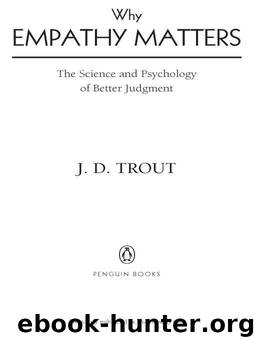Why Empathy Matters: The Science and Psychology of Better Judgment by J. D. Trout

Author:J. D. Trout
Language: eng
Format: mobi
Tags: Empathy, Psychology, Cognitive Psychology, Philosophy & Social Aspects, Science, Philosophy, General, Interpersonal Relations, Helping Behavior, Social, Social Psychology, Sociology, Social Science
ISBN: 0143116614
Publisher: Penguin
Published: 2010-01-02T05:00:00+00:00
CHAPTER 5
Stat versus Gut
A Free Lunch
I HAVE ALWAYS LOVED THE IDEA THAT YOU COULD CATCH DELICIOUS crabs with a festering flounder carcass. Something for almost nothing: as bait, the ripe flounder works just as well as fresh salmon. Wouldn’t it be great if decision making could be made more like crabbing? Then we would spend less on decisions that were more reliable. Of course, the act of crabbing is itself enjoyable, a value known in economics as a “process utility.” But even if it weren’t, the cost structure of recreational crabbing is irresistible. And it keeps you coming back. We might abandon reliable reasoning strategies less often if great gains cost so little.
Fortunately, some decisions are still cheap and effective. One example is close to the hearts of many parents. In maternity wards throughout the country, doctors have always done their best to assess the medical condition of newborns, looking intuitively at some combination of signs and judging the importance of each. Clinical experience can be a hazy basis for such time-sensitive and high-stakes judgments. Decisions a doctor makes in the first five minutes of a newborn’s life can permanently affect the child’s prospects. But in 1952, an obstetrical anesthesiologist named Virginia Apgar imposed welcome discipline on this subjective process. The Apgar score, as it came to be known, provided a fast and reliable way of determining the clinical condition of a newborn one minute after birth. The score was the sum of five numbers, each based on a sign: heart rate, respiratory effort, reflex irritability, muscle tone, and color. Each factor was assigned a zero, one, or two. A score of ten indicated that the newborn was in the best condition possible. This fast and reliable diagnostic tool allowed doctors to snap into action if need be, beginning resuscitation or other immediate action. There is no way of knowing exactly how many newborn lives were saved by this modest score, and how many more were spared a diminished life. Now more than fifty years after its inception, nearly every neonate in the United States is still assigned an Apgar score shortly after birth. Some people may feel it is demeaning to assign a number to a human, but it is hard to know where this feeling comes from. Is it a visceral reaction? Is it a reasoned judgment? Whatever the source, this is one number that allows doctors and patients alike to be more human. It allows the doctor to deliver treatment tailored to the specific needs of the infant, and it can allow the infant to have, well, a life.1
Many people have a strong negative reaction to the use of numbers in human affairs. It invokes the image of an impersonal and un-caring bureaucracy, the faceless allocation of goods to citizens without names. And yet, here we have a newborn baby, treasured in every culture, the object of joyful tears and lavish attention, whose life and prospects are protected by a simple sum. This fact alone should help us set aside any knee-jerk reactions against the use of numbers in human dealings.
Download
This site does not store any files on its server. We only index and link to content provided by other sites. Please contact the content providers to delete copyright contents if any and email us, we'll remove relevant links or contents immediately.
The Art of Thinking Clearly by Rolf Dobelli(9816)
Mindhunter: Inside the FBI's Elite Serial Crime Unit by John E. Douglas & Mark Olshaker(8656)
Change Your Questions, Change Your Life by Marilee Adams(7324)
Nudge - Improving Decisions about Health, Wealth, and Happiness by Thaler Sunstein(7199)
Mastermind: How to Think Like Sherlock Holmes by Maria Konnikova(6898)
The Power of Now: A Guide to Spiritual Enlightenment by Eckhart Tolle(5295)
Men In Love by Nancy Friday(4938)
Altered Sensations by David Pantalony(4834)
Factfulness: Ten Reasons We're Wrong About the World – and Why Things Are Better Than You Think by Hans Rosling(4458)
The Confidence Code by Katty Kay(3996)
Thinking in Bets by Annie Duke(3973)
Man and His Symbols by Carl Gustav Jung(3807)
The Worm at the Core by Sheldon Solomon(3295)
Why Buddhism is True by Robert Wright(3262)
Three Women by Lisa Taddeo(3256)
Liar's Poker by Michael Lewis(3193)
Descartes' Error by Antonio Damasio(3141)
The Inner Life of Animals by Peter Wohlleben(3076)
The Power of Mindful Learning by Ellen J. Langer(3058)
